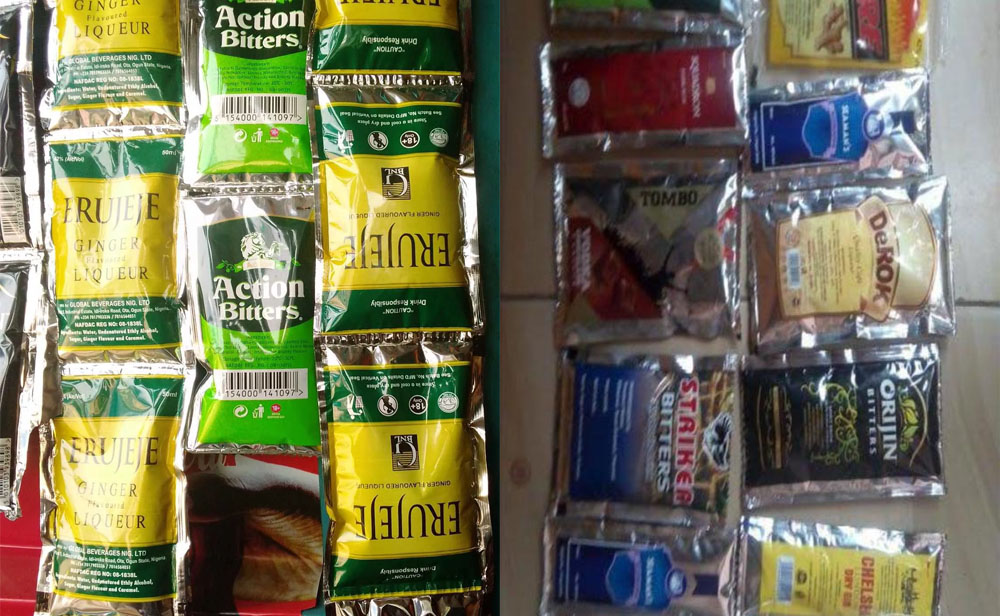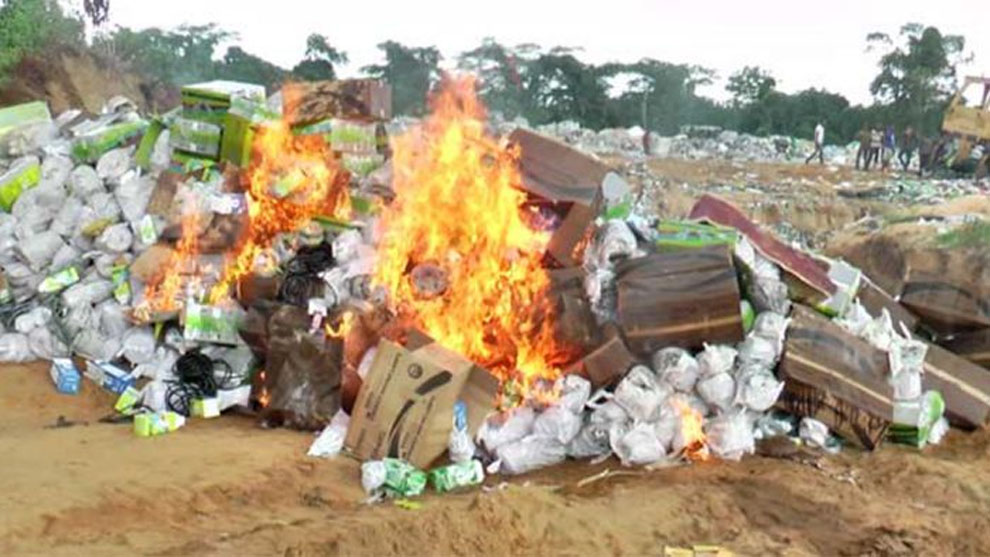Health
BREAKING: FG bans alcoholic beverages in small sachets

BREAKING: FG bans alcoholic beverages in small sachets
The National Agency for Food and Drug Administration and Control (NAFDAC) has banned alcoholic beverages produced in sachets less than 200ml.
The agency said the five-year window given to the manufacturers of the products to stop producing the drinks in sachets and pet bottles which began in 2018 elapsed on January 31, 2024.
She said enforcement of the ban commenced on February 1, 2024.
The director-general of NAFDAC, Prof Mojisola Adeyeye, while addressing the media over the development in Abuja on Monday, February 5, said the ban was not a sudden development but a result of a multilateral Committee that agreed that the ban would be in phases whereby production would be reduced by 50 percent by 2020 while outright ban would be on January 31, 2024.
Given that decision, the DG said NAFDAC did not issue renewal licenses exceeding January 2024 to any manufacturer of the products.
According to her, the agency took the route of wiping out the drinks in such sachets because of the negative effects on underage children.
She said because the drinks come in pocket-friendly sizes, accessible and affordable, children easily fell for the packages only to face the consequences in the future.
She said: “This decision was based on the recommendation of a high-powered committee of the Federal Ministry of Health and NAFDAC on one hand, the Federal Competition and Consumer Protection Commission (FCCPC), and the Industry represented by the Association of Food, Beverages and Tobacco Employers (AFBTE), Distillers and Blenders Association of Nigeria (DIBAN), in December 2018.
“As a commitment to the decision reached at the end of this Committee meeting, producers of alcohol in sachets and small volume agreed to reduce the production by 5 percent with effect from 31st January 2022 while ensuring the product is completely phased out in the country by 31st January 2024”.
READ ALSO:
- High cost of living: NANS demands action from Tinubu, gives ultimatum
- Man murders Canada-bound lover, kills self in Lagos
- Just in: Anger mounts as Nigerians protest high cost of living in Minna
According to her, the future of the country supersedes other considerations in the enforcement of the policy.
Noting that saving Nigerian children and protecting the health of the larger society is paramount, Adeyeye said: “The people who are mostly at risk of the negative effect of consumption of the banned pack sizes of alcoholic beverages are the under-aged and commercial vehicle drivers and riders.
“The World Health Organization has established that children who drink alcohol are more likely to: use drugs, get bad grades, suffer injury or death, engage in risky sexual activity, make bad decisions and have health problems.
“The World Health Organization also stated that harmful consumption of alcohol is linked to more than 200 health conditions including infectious diseases (tuberculosis and HIV/AIDS) and non-communicable conditions (liver cirrhosis and different types of cancer).
“It is also associated with social problems such as alcohol addiction and gender-based violence.
“To curb the menace of abuse of alcohol, the World Health Organization recommended some actions and strategies to Policy-Makers that have shown to be effective and cost-effective, which include: regulating the marketing of alcoholic beverages (in particular to younger people) and regulating and restricting the availability of alcohol.”
READ ALSO:
- Entertainment industry mourns as veteran folk singer, actor Jimi Solanke dies
- Nigerian cost of living lowest in Africa, says presidency
- Ekiti: How I escaped traditional rulers’ killers – Alara of Ara-Ekiti
She said in the course of enforcing the ban it was discovered that some manufacturers were still in production of the banned products and still had stacks of both finished products and packaging materials of the products in their possession.
She noted: “This situation is of course not acceptable, and the Agency views this as flagrant disobedience to the laws of Nigeria. NAFDAC views this matter seriously and will engage all statutory means, which may include prosecution, to deal with the matter”.
She warned that there is no going back on the decision, saying, “I want to use this medium to ask all holders of alcohol in sachets, PET and Glass bottles, empty sachets, PET bottles, empty Glass bottles, and other packaging materials of these banned products to immediately report to the Investigation and Enforcement Directorate of NAFDAC for hand-over of same to NAFDAC for destruction, to prevent sterner measures including prosecution.
“NAFDAC is resolutely committed to the strict implementation of the regulations and regulatory measures towards safeguarding the health of Nigerians, particularly the vulnerable youth, against the dangers of reckless consumption of alcohol.”
BREAKING: FG bans alcoholic beverages in small sachets
Health
Drug prices may drop as FG implements zero VAT, duties

Drug prices may drop as FG implements zero VAT, duties
Experts say prices of drugs are likely to drop following the implementation of the federal government’s executive order on zero VAT and excise duties on pharmaceutical products and medical devices.
The Nigeria Customs Service yesterday said it had commenced the implementation of Value Added Tax (VAT) and import duty exemption on raw materials essential for the production of pharmaceutical products.
The National Public Relations Officer of the Nigerian Customs Service (NCS), Assistant Comptroller of Customs, Abdullahi Maiwada, in a statement on Wednesday, said the decision was in line with the presidential order to boost local production of healthcare products
President Bola Tinubu had, in June last year, signed the Executive Order to increase local production of pharmaceutical, diagnostics and medical devices.
The NCS’ spokesman said: “Critical raw materials essential for the production of pharmaceutical products will be exempted from import duty and Value Added Tax (VAT) for a period of two years.”
The statement added that the exemption covers Active Pharmaceutical Ingredients (APIs), excipients and other vital raw materials required for manufacturing essential medicines, Long-Lasting Insecticidal Nets (LLINs), Rapid Diagnostic Kits, reagents and packaging materials.
READ ALSO:
- Ex-Kano emir Bayero cancels Sallah durbar amid tension
- Poland suspends migrants’ right to apply for asylum
- Trump slaps 25% tariffs on car imports to US
- Reps pass bill to strip Vice President, governors, deputies of immunity
Maiwada said to ensure that these fiscal incentives are fully utilised, eligibility is limited to manufacturers of pharmaceutical products recognised by the Federal Ministry of Health and Social Welfare, provided they possess a valid Tax Identification Number (TIN).
Experts speak
Experts said the implementation of the Executive Order would address the skyrocketing cost of medicines.
A former National Secretary of the Pharmaceutical Society of Nigeria (PSN), Pharm. Iyiola Gbolagade, in a chat with our correspondent, described the implementation of the Executive Order as commendable, saying it would lead to reduction of prices some locally manufactured medicines like antibiotics and antimalarial drugs.
A former chairman of the Association of Community Pharmacists of Nigeria (ACPN) FCT chapter, Pharmacist Eneojo Made, said the implementation of Zero VAT and exercise duties on Active Pharmaceutical Ingredients (APIs), which are used to produce medicines, would boost the production of essential medicines for various categories of diseases thereby enhancing availability and access to them in the country.
A former National Publicity Secretary of the Association of Community Pharmacists of Nigeria (ACPN), Kenneth Edeh Ujah, said, “When the cost of production of medicines at various stages is lower, of course, it is going to have that direct impact on the eventual cost of the medicine when people visit the pharmacy to buy their drugs.”
Also, Prof Cyril Odianose Usifoh, the immediate past president, Pharmaceutical Society of Nigeria (PSN), said the potential for success in the order was boosted because specified items include Active Pharmaceutical Ingredients (APIs), excipients, essential raw materials required for manufacturing of crucial products, including drugs, long lasting insecticidal bed nets, rapid diagnostic kits and others.
The Federal Ministry of Health and Social Welfare had, in a statement, said the Executive Order is a significant milestone, as it opens the door for local pharmaceutical and medical device manufacturers to begin fully benefiting from the relief measures outlined by President Bola Ahmed Tinubu in the Executive Order
Drug prices may drop as FG implements zero VAT, duties
Health
Nigerian doctor pioneers W’Africa first robotic prostate cancer surgery

Nigerian doctor pioneers W’Africa first robotic prostate cancer surgery
A Nigerian Consultant Urological/Robotic Surgeon, Professor Kingsley Ekwueme on Monday in Lagos pioneered the first West African robotic surgery on a prostrate cancer patient.
Ekwueme, a UK-based medical doctor returnee recently established The Prostate Clinic, (TPC) Nigeria Centre for Robotic and Laparoscopic Surgery, the first super-specialised clinic in West Africa dedicated to the diagnosis and treatment of prostate cancer, utilising cutting-edge robotic surgery.
“This is truly historic,” declared Ekwueme, the clinic’s founder.
“We are bringing technology that has never been seen before in this region, giving Nigerians access to world-class treatment right here at home.”
The clinic’s centerpiece is the Da Vinci Robot, an advanced surgical system that provides unparalleled precision and minimally invasive procedures. “
Briefing journalists on the feat, Ekwueme explained that: “The Da Vinci Robot offers three-dimensional imaging and seven degrees of freedom, allowing for surgeries with minimal blood loss and faster recovery times.”
“Patients experience significantly less pain and scarring compared to traditional open surgeries.”
Ekwueme, a renowned urologist, emphasised that the technology extends beyond prostate cancer.
“We are treating a range of urological conditions in both men and women, including kidney cancer, bladder cancer, kidney stones, and benign prostatic hyperplasia. Our goal is to transform surgery in Nigeria.”
READ ALSO:
- How 12 inmates escape in Kogi jailbreak – Prison spokesman
- Fubara: Supreme Court reacts to photo of Justice Agim with Wike
- Aviation workers threaten nationwide airports shutdown over Customs officer assault
Noting that the key focus of the clinic was accessibility, he said he is determined to make these advanced procedures affordable for all Nigerians.
“My mission is to ensure that no one in this country dies needlessly due to a lack of access to quality care.
“We are working to make these procedures as cost-effective as possible, and we are open to partnerships with the government to expand our reach.”
To address Nigeria’s power challenges, the clinic is equipped with a comprehensive solar power system, ensuring uninterrupted operations. “We understand the importance of reliable power.
“Our 24-hour solar system ensures that we can provide consistent, high-quality care.”
He said he is also committed to training local medical professionals in robotic surgery, ensuring the long-term sustainability of the technology in Nigeria.
“We are investing in the future of Nigerian healthcare. We want to empower our doctors with the skills they need to provide world-class care.”
Debunking common misconceptions about prostate and sexual activities, Ekwueme clarified that there is no proven dietary prevention for prostate cancer. “The primary risk factors are age, race, and family history. Early detection and access to advanced treatment are crucial.”
Looking ahead, Ekwueme revealed plans to introduce groundbreaking technology for benign prostatic hyperplasia (BPH) with zero blood loss.
“I am doing a procedure tomorrow, and soon I will unveil a technology that has never been done in Africa, splitting the prostate from the inside with absolutely no blood loss,” he stated.
He said with its state-of-the-art technology, commitment to affordability, and focus on local training, The Prostate Clinic Nigeria Centre for Robotic and Laparoscopic Surgery is poised to revolutionise cancer care in West Africa, offering hope and advanced treatment options to countless Nigerians.
Nigerian doctor pioneers W’Africa first robotic prostate cancer surgery
Health
FG destroys another 200 containers of expired drugs

FG destroys another 200 containers of expired drugs
The Federal Government Joint Committee on the destruction of fake, illicit and expired pharmaceuticals has destroyed another 200 containers of substandard drugs worth billions of Naira imported into the country through the Apapa and Tin-Can Island seaports.
This is coming after the committee initially destroyed 250 containers of the same expired pharmaceutical products in January, 2025.
To this end, the committee comprising the Nigerian Customs Service (NCS), National Security Adviser (NSA), National Drug Law Enforcement Agency (NDLEA), National Agency for Food Drugs Administration and Control (NAFDAC) and Nigerian Army has destroyed a total of 450 containers of expired drugs in the first quarter of 2025.
The destruction exercise which took place in Epe, Lagos State yesterday, was part of a broader initiative of the Federal Government to curb importation of illicit and controlled drugs in order to safeguard public health and curb drug-related crimes in the country.
The pharmaceuticals destroyed were Tramadol, codeine, Apetamine, and Analgin injection amongst others.
Speaking to newsmen, the National Security Adviser (NSA), Mallam Nuhu Ribadu, said the initiative was important to prevent the circulation of dangerous substances such as Tramadol and Codeine, which are often abused, thus contributing to criminal activities in the country.
READ ALSO:
- Rivers court bars woman from answering ex-husband’s name
- PDP gives condition to back Atiku, Obi, El-Rufai in 2027
- Gov Fubara’s suspension dents Nigeria’s image, says ex-President Jonathan
Mallam Ribadu, who was represented by Ibrahim Sulaiman, said the destroyed drugs were seized at Apapa, Tin Can, and Lekki seaports.
He, however, disclosed that similar destruction was conducted in Port Harcourt as part of the first phase.
“The National Security Adviser is very passionate about ensuring that these illicit drugs do not remain in circulation. The government will not allow perpetrators to act with impunity; they will be arrested and prosecuted,” he stated.
The intercepted drugs were either expired or classified as controlled substances that should only be used under strict medical supervision.
Also, the Assistant Customs Controller, A.O Oguntuase from FOU Zone A, emphasised the enforcement efforts of security agencies in tracking and intercepting these illegal imports.
“Through intelligence gathering and swift action, we have been able to prevent the distribution of these drugs.
“The value of the destroyed substances is enormous, with each container estimated to be worth close to a billion naira,” he said.
On his part, representative of the NDLEA, DC Omotosho Solomon, stated that suspects arrested in connection with the goods were being tried in court.
Solomon warned importers engaged in the trafficking of illicit drugs and pharmaceuticals to desist from such acts or face the full process of law on illegal importation.
FG destroys another 200 containers of expired drugs
-

 metro19 hours ago
metro19 hours agoBREAKING: Senator Natasha defies restrictions, arrives homecoming rally by helicopter [VIDEO]
-

 metro2 days ago
metro2 days agoHow they murdered my Kano-bound passengers in Edo
-

 metro1 day ago
metro1 day agoUromi: Edo residents flee towns over likely reprisal attack, arrest
-

 International2 days ago
International2 days agoIn pictures: Eid celebrations around the world
-

 metro1 day ago
metro1 day agoBreaking: ‘Cancel your homecoming’ — Police tell Senator Natasha
-

 metro2 days ago
metro2 days ago‘I was offered N5bn bribe to impeach Fubara’
-

 metro2 days ago
metro2 days agoKano Gov Yusuf, Sanusi linked to Eid killings
-

 Sports2 days ago
Sports2 days agoNigerian boxer collapses, dies in ring during fight in Ghana













